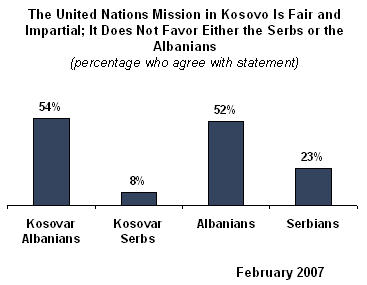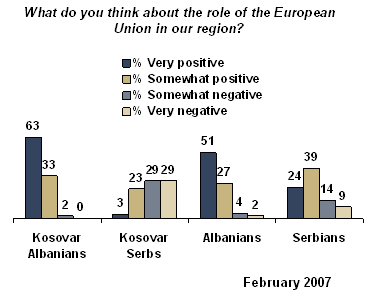GALLUP NEWS SERVICE
PRINCETON -- When it comes to the future of Kosovo, the only guarantee at this point seems to be that no solution will please everyone. That doesn't bode well for the stability of the region, but with Kosovo's Albanian and Serb populations deadlocked over the question of independence, the international community will be forced to impose a solution. The trick then becomes to find the one that will forestall conflict and maintain enough stability that economic development can gain a foothold and increase the desire among all parties to work for peace.
The United Nations Security Council is currently considering a Western-backed plan developed by UN envoy Marttii Ahtisaari under which Kosovo would be independent, but supervised by the UN and the European Union. An "International Civilian Representative" would be appointed with the power to remove political leaders from office and impose or annul laws in Kosovo.
The Ahtisaari plan has met with resistance from both sides, but while it has been rejected outright by Serbia's leaders, Kosovo's prime minister Agim Ceku has declared it acceptable. Gallup World Poll data from the region indicate that, even aside from the question of independence, intervention by the UN and EU is far more likely to be viewed positively by ethnic Albanians -- both inside and outside Kosovo -- than by Serbians. Just over half of Albanians say they feel the current UN mission in Kosovo, which has administered the territory as a protectorate since 1999, is fair and impartial. Just 8% of Kosovo's Serbs agree, and those in Serbia are only somewhat more likely to do so, at 23%.

Under the Ahtisaari plan the EU would play the foremost supervisory and peacekeeping role in Kosovo moving forward. As with opinions of the UN, Albanians are far more likely than Serbs to view EU involvement positively; in fact, almost two-thirds of Kosovar Albanians (63%) say they think the EU plays a "very positive" role in the Balkan region, compared to just 3% of Kosovar Serbs. Among those living in Serbia, however, perceptions of the EU are much more positive, probably in part a reflection of the Serbian government's aspiration to become an EU member within the next decade.

Survey Methods
Results are based on face-to-face interviews conducted in February 2007 with randomly selected samples of about 1,000 residents aged 15 and older in Kosovo, Serbia, and Albania. For results based on the full samples in each country, one can say with 95% confidence that the maximum error attributable to sampling and other random effects is ±4 percentage points. For results based on the sample of 714 Kosovar Albanians, one can say with 95% confidence that the maximum error attributable to sampling and other random effects is ±4 percentage points. For results sample of 257 Kosovar Serbs, one can say with 95% confidence that the maximum error attributable to sampling and other random effects is ±7 percentage points. In addition to sampling error, question wording and practical difficulties in conducting surveys can introduce error or bias into the findings of public opinion polls.
